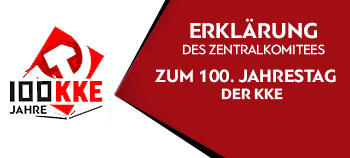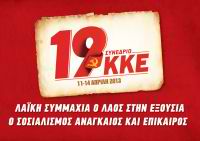Links to the old web pages of KKE
THE PARTY SUCCESSFULLY MET THE CHALLENGES IN THE COMPLEX CONDITIONS FROM THE 20TH CONGRESS
5. We estimate that overall our Party successfully met the challenges, under the political guidance of the Central Committee (CC) elected at the 20th Congress and the Political Bureau (PB) that is assigned to guide it between its meetings. In this direction, the CC organized a rich ideological–political intervention focusing on the 100 years of the KKE, the 100 years of the October Revolution and the Communist International. Relevant books, collections of articles, documents, etc. were published, as well as the four volumes of the History Essay of the KKE, covering the period from its founding until the end of the Civil war and the defeat of the Democratic Army of Greece (DSE), which were discussed and approved by a Nationwide Conference (2018), based on the Resolution of the 20th Congress.
A broad network of preserving historical memory was created, with museums and monuments for the most significant events of the class struggle in Greece and the Party's history, mostly of the 1940s and the DSE period. A series of central and local publications as well as numerous events took place, which contributed to the development of the Party's ties with new political forces and especially with descendants of the National Resistance and DSE fighters, of political refugees, regardless of their current political stance.
This activity was accompanied by seminars, the KNE–Odigitis festivals and interventions of ideological–political character, focusing on the necessity of socialism–communism, its economic– social–political content, the interpretation of its historical first attempt in the 20th century, while at the same time its examination was continued.
As a result of political activity the level of the events was improved and the events took on a broader character serving as a basis for our work. The Scientific Conferences have been a significant and remarkable activity in terms of quality as well. However, the respective activity at regional or local level was based, to a great extent, on the intervention of the higher leading organs or at least was supported by staff of the CC, while its reproduction at the level of the PBO was limited and occasional.
The KNE has struggled manfully at the side of the Party. It further elaborated theses and goals, following its 12th Congress in 2019, at which it specialized its comprehensive intervention to the youth by utilizing the vast experience it had gained struggling at the side of the Party for half a century.
A more intensive programme of political work was organized over these years, with visits to workplaces and districts, meetings, and rallies. We engaged in the battle for the Party's finances, with annual fund-raising campaigns, while in 2020, due to the particular circumstances, we successfully organized three fund-raising campaigns. As a result of consistent work for the 8 past years since the 19th Congress, the Party's finances have been put in order; perennial problems have been resolved or are to be resolved. A battle was waged against the prohibitions and the reactionary laws regarding parties' finances.
At the same time, the Party, under the political guidance of the CC, engaged in important political battles, such as the triple elections (municipal–regional, European, parliamentary), organizing them with a unified content, something that was an important qualitative step forward.
It also waged important battles in phases of sharpening of the refugee issue, it revealed the causes and the culprits. It proposed solutions from the perspective of the refugees and the Greek people's needs.
6. Our party struggled for the regroupment of the labour–trade union movement and its forces sharpened the confrontation with the employer-led trade unionism forces, against phenomena of degeneration and rigging, the legal action and other repressive interventions against the trade union movement (Patras, Trikala, Panhellenic Metalworkers' Federation–OEM, Congress of the General Confederation of Greek Workers–GSEE , etc.).
In the conditions of the pandemic, which were used by the government and the state in order to strike a blow to the movement and the Party, it has been at the forefront of the struggle in order to convey the message of resistance, struggle, and “organized disobedience”, with significant interventions and mobilizations of the mass movement, such as those of the workers in healthcare and trade, in the class-oriented trade unions rallying in PAME (All Workers’ Militant Front), especially during the demonstration of the 1st of May, the events for the 47th anniversary of the Polytechnic Uprising, the nationwide general strike on the 26th of November, etc.
The PB and the Secretariat made an effort to specialize the Resolutions of the CC concerning the issues of the Party's activity in the movement under these conditions. There was a rise of initiatives and planned interventions in the movement on popular problems such as in Attica, West Thessaloniki, Karditsa, Evia, and LARCO.
We did not manage to conduct the Nationwide Conference on the work in the working class, despite that the Party activity in the period from the 20th Congress has accumulated new facts in the struggle for the change in the correlation of forces in Labour Centres and Federations, in the sharpening of the struggle to reveal the government and employer-led trade unionism in GSEE, etc. Thus, the CC decided that our work in the working class and its movement should become an object of concern and further elaboration at the 21st Congress.
7.During these past 4 years, the Party members and cadres played a leading role in the organization of the struggles of the farmers and the urban self-employed against EU, government and employer attacks, as well as in the struggles of school and university students and the radical women's movement. In a lot of cases, they contributed to the rallying of new forces, to processes of improving the correlation of forces in trade unions, federations and Labour Centres, the farmers' movement, the school and university students' movement and less in the movement of the self-employed. They contributed to the slight increase in the forces rallying around the radical women's movement, although this is not expressed in all associations–groups or in all regions of the country, while, since the lockdown, there are visible signs of an irregular operation of associations’ boards and general assemblies.
Especially in the farmers' movement, the Party members and cadres contributed to some extent to the establishment of the Nationwide Committee of the Roadblocks (PEM) as a form of nationwide coordination, representing federations and farmers' associations.
In these past 4 years, the Nationwide Conference on the work of the Party in the urban self-employed and the Extended Plenum of the CC for the examination of the work in toiling farmers took place, in accordance with the decisions of the Congress. These bodies, as well as the preceding or following process of inner-party discussion, help to form a unified and, above all, conscious perception of the necessity to intervene in the popular and allied forces of the working class; to more accurately define them; to enrich our positions on their perspective in socialist society, on issues of current ideological–political struggle, the elaboration of a framework and objectives of struggle; the promotion of joint action in the perspective of forming a social alliance in an anti-capitalist and anti-monopoly direction.
8. Although a more detailed political analysis on the movements will be made in a separate text, we can mention a general assessment, i.e. that the Party’s prestige and influence as a vanguard and consistent force in the struggle for the acute popular problems is rising among a significant part of forces that join the struggle. In some cases, an expansion of the forces and the influence of the Party and KNE is noted. Overall there was no significant change in relation to participation in movements or a distinct rise of militant sentiments or, whenever observed, they were at least fragile and characterized by a tendency of regression. The rationale of delegating responsibilities, fatalism, and fear instead of participation in the movement and the struggles continue to prevail among the working people, even though they appreciate the Party for its struggle in defence of their interests. A part of the workers, despite participating in the struggle and recognizing the Party's activity, remains influenced by the logic that “there is no way out”, the positions of the Party are not understood as being “realistic”.
This situation is also a reflection of the fact that from the 20th to the 21st Congress and in honour of the 100 years of the Party, neither the Party nor the KNE have managed —given the current conditions— to significantly expand their forces and rally an as large as possible section of the working class and its allies around them. This factor, however, is decisive for a distinct rise of the workers' and people's movement in terms of mass participation and militant orientation.
The goal set by the 20th Congress remains the consolidation of the Party at the productive ages in the industrial sector and in places where salaried employees gather. The steps taken during this period show the potential. However, the utilization of this potential on a large scale requires a more targeted effort to prepare new communist forces, with a more planned and systematic ideological, political, and organizational effort, in order to overcome the inhibitions stemming from the difficulties of everyday life, the general passive climate, the fear of unemployment, insecurity, etc.







